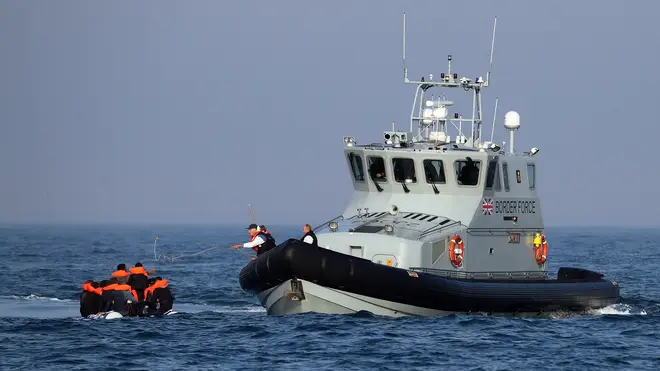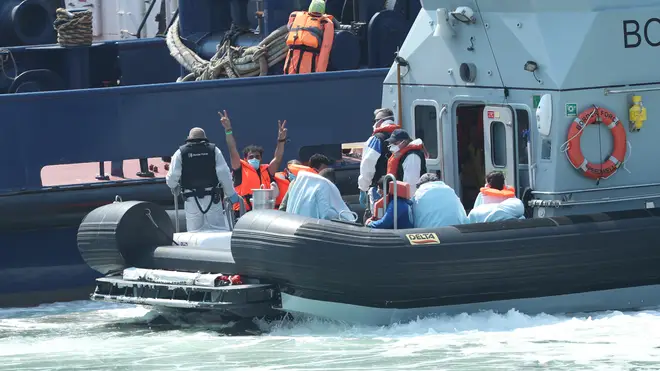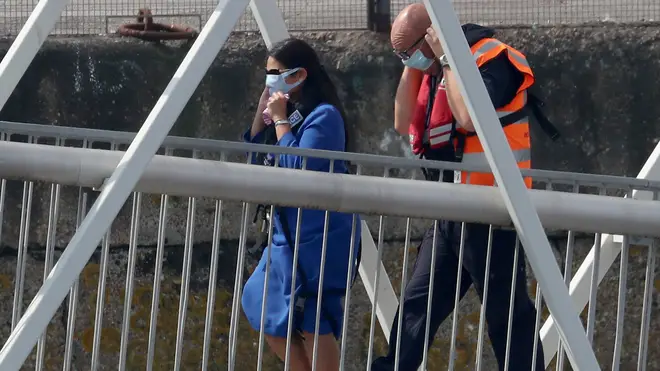
Oli Dugmore 4am - 7am
10 August 2020, 20:39

The UK Border Force is "not equipped" to deal with migrants becoming violent, making Priti Patel's plan to tackle the crisis "unfeasible", an expert has said.
Hundreds of migrants are making the dangerous crossing each week, with it taking many people up to 10 hours on a small, cramped boat often covered in vomit and other bodily fluids which seep into their clothes.
Lucy Moreton, professional officer for the Union for Borders, Immigration and Customs (ISU) said despite numerous media headlines saying the number of crossings have ramped up, the reality is that the numbers have remained stable in comparison to previous years.
She told LBC News that the larger number of migrants making crossing attempts on singular days are down to the recent spate of good weather, making sea conditions calmer.
But despite the Home Secretary's claim she wants the French to intercept and return migrant boats found trying to cross, Ms Moreton says that is "really questionable".
Currently when UK Border Force officials encounter vessels being used by migrants, those aboard are "reasonably calm" but if the situation were to become volatile, crew are not trained or equipped to deal with any violent outbursts.

"We are just not cut out for that type of potentially very violent encounter," she said.
"We don't have the kit and we don't have the training. This is essentially military manoeuvres at sea. Border Force have four Cutters of which two are sea at any one time.
"Ordinarily they are crewed by 14 people but right now they are on minimal crewing and only crewed by six, due to Covid-19.
Read more: PM brands migrant crossings 'very bad, stupid, dangerous and criminal'
"You can board 40 or 50 migrants on these vessels, but we've got no secure detention, no real way of holding them.
"Crews on Cutters are there to save lives, that's what they've been trained to do."
She continued: "Staff have expressed concerns over the level of violence they are encountering,"

The RAF has deployed a surveillance aircraft to the Channel as an "initial offer of assistance" to the Home Office.The Navy could also be deployed to turn round small boats used by migrants hoping to reach the UK.
Ms Patel visited the Kent coast on Monday and is understood to have boarded a police vessel and met with Border Force officials as part of measures to address the issue.
Currently under government guidelines, migrants who arrive on the shores are not routinely given Covid-19 tests, unless they are symptomatic.
But despite the risk some may have the virus, Ms Moreton says that simply by moving migrants along from known camps on the French coast, it just pushes where they depart from further down the coast.
"The French could do more to patrol the beaches but that requires more man power," she said.
"We've spent billions over the past decade helping the French reinforce their ports, and usually what happens is you just move the traffic down the coast a little bit.
"The more we give the French financial support to remove the permanent camps because nobody deals with the individuals, they don't give up and go home they try again.
"You could patrol the beaches better, but what happens is they just try to cross from further away. We could join hands at the coast line and they'll still get through. It's just not possible to secure it."

UK vows action after record-high migrant sea crossings
So what is feasible?
"All the alternatives are really, really political," Ms Moreton said.
"Intake centres based in other countries, so if they want to claim asylum in other countries then they can approach an intake centre in a refugee camp.
"If you cross the Channel illegally or make any other crossing, somehow we would not consider the asylum application because there are other lawful routes to do it.
"But equally in practice we are under international obligations that require us to consider the application regardless of how the individual got here, so theres a little bit of squaring that with the international community.
"Many of the individuals have made it their life's work to get to the UK. They didn't wake up one day and decide this was a good idea.
"The majority hanging around northern France are not fleeing war or persecution, they have simply walked up through Europe.
"But if you sit down and talk to them they find it hard to communicate why they have done it. Some of the reasons are very obvious, they get a house, they get money for food they get education, they get a job, they get medical care.
"But we're in a position where the answers are so unpalatable that they're not politically possible."